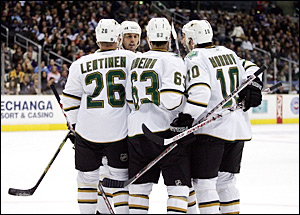Spinning their wheels
The music finally stopped on Tuesday morning when owner Tom Hicks -- who apparently needed Saturday's meltdown against the Kings to recognize the dysfunction that has long plagued this team -- announced that the first man who was left without a chair was general manager Doug Armstrong. On Wednesday, long-time team president Jim Lites was shuffled over to the Hicks Sports Marketing Group and replaced by Jeff Cogen, who has been toiling as president of the Texas Rangers, the major league baseball team that Hicks also happens to own.
As far as it goes, this was an attention grabber. But any hope that the Stars will change for the better on the ice is as tenuous as their playoff chances. Hicks announced that Les Jackson and Brett Hull are in charge for the rest of the season as interim co-GMs.
Exactly what this team needs. More treading water.
Hicks' approach -- handing power to two men on an interim basis for the rest of the season -- could prove more disastrous than doing nothing. After all, will they -- or should they -- have the power to make the kind of dramatic moves this franchise needs when both guys are on a short leash? And the potential for paralysis if the two men disagree on a possible move seems high. But here's news that's sure to allay the fears of Stars fans: if Jackson and Hull come to blows over a decision, the final call goes to a highly-regarded hockey man.
Tom Hicks.
I guess Maggie The Monkey couldn't break out of her deal with TSN. Just call this Islanders West, as Charles Wang's goofy rule-by-committee philosophy seems to be taking hold.
As it is, handing the reins to the inexperienced Hull along with Jackson, a man who was intimately involved with the team's ongoing drafting failures, seems counterintuitive, especially when former Kings GM Dave Taylor --newly hired as the Director of Player Personnel and far less attached to the players in the system -- is on hand.
The case for slipping the noose around Armstrong's neck was solid. Sure, his teams had won a pair of Pacific Division titles and captured the third-most regular season wins in the NHL during his five-year tenure. But when you're a good team, it's all about the playoffs. Three consecutive one-and-done performances -- and no sign that the Stars' fortunes would improve in the future -- made it clear that the organization was heading in the wrong direction under his stewardship.
Although Armstrong won a few along the way, his overall trade record was brutal, starting with the one in 2002 that sent Joe Nieuwendyk, Jamie Langenbrunner -- and the Stanley Cup -- to New Jersey for Jason Arnott and Randy McKay. His head-scratching deals at last season's deadline -- a first-rounder to Phoenix for underachieving eight-goal scorer Ladislav Nagy and a first- and second -rounder as part of a package for aging defensive-minded blueliner Mattias Norstrom -- needlessly mortgaged the future and would probably have led to his dismissal last spring were Hicks any kind of hockey man.
There were also the fruitless free-agent signings like Pierre Turgeon, Donald Audette and Eric Lindros. This past summer, Armstrong's acquisitions were limited to borderline NHLers Todd Fedoruk and Brad Winchester while proven scorers like Ryan Smyth and Jason Blake ended up elsewhere.
And there was the legacy of failed drafts. The Stars haven't selected a 20-goal scorer since Bob Gainey tapped Brenden Morrow in 1997. They have routinely passed on scoring forwards in favor of blueliners. Just two players acquired under Armstrong's watch -- Trevor Daley and Matt Niskanen -- are currently with the team. Neither is expected to become an impact player.
In short, Armstrong's mish-mash lineup was simply holding on while aging Stars like Mike Modano, Sergei Zubov and Jere Lehtinen played out the string.
Dallas fans, far more savvy than management ever gave them credit for, recognized this. They also recognized that a night at a Stars game rarely provided a decent return on the investment.
Pro sports is supposed to be about entertainment. Winning's a big part of that, to be sure. But these Stars were an uninspiring squad. In the go-go New NHL, they remained a defensive-minded dinosaur so dull that their own "Havoc Fanatic" section -- reserved for the team's most boisterous and devoted acolytes -- was less than half-full most nights. Announced attendance routinely topped 17,000, but unless a third of that crowd was milling about in the concourse, that number gave a false impression of actual bums in the seats. The tickets may have been purchased, but people couldn't be bothered to show up and watch this team.
Sooner or later, people who stop attending games stop buying tickets. And that's something Hicks understands all too well.
That's probably part of why Hull is half of the new hydra-headed management monster. Where Armstrong was the very definition of stoic, Hull is boisterous, and one of the game's great personalities. If the organization was looking for someone who can capture the attention of a disinterested local media, as well as fire up the faithful, Brett Hull is the ideal candidate.
But this team needs more than a colorful front man. It needs a fresh direction. And while we can never say never, this two-man arrangement with an arbitrator makes that highly unlikely.
When the summer arrives -- probably on April 7 for this crew -- Hicks can conduct a more thorough external search for Armstrong's successor. In the meantime, someone on the ice has to step it up and stop a few pucks, make a few hits, and put a few behind the opposing goalie. Unless that happens, these moves won't amount to much at all.





